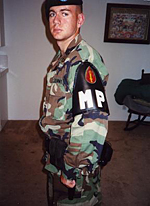The Few, The Proud, The Jewish
By Benjamin Nadler
 Since arriving in Iraq, 22-year-old Army National Guardsman Ryan Sanshuck has been shot at, gone through rocket and mortar fire, and ridden in a truck while it only narrowly avoided destruction by a powerful Improvised Explosive Device.
Since arriving in Iraq, 22-year-old Army National Guardsman Ryan Sanshuck has been shot at, gone through rocket and mortar fire, and ridden in a truck while it only narrowly avoided destruction by a powerful Improvised Explosive Device.
The experience, writes Sanshuck in an email from Iraq, “has taught me the power of prayer and my belief in hashem has been strengthened.”
Sanshuck is a member of a stereotype defying and often overlooked demographic: Jews in the United States Military.
Jews in the U.S. Military are, in fact, nothing new. Jews have been fighting for the United States all the way back to the Revolutionary War. The oldest active veterans association in the United States is The Jewish War Veterans of the USA, which was founded in 1896 by Jewish Civil War veterans.
Nonetheless, the current numbers are quite small. According to The Jewish Soldier Foundation, a group which provides advocacy and support for Jewish military personnel, there are only about 1,500 self identified Jews in the U.S. Army (the largest branch of the U.S. military), out of a total of about 500,000 active Army personnel. The actual number of Jews is somewhat higher, though, considering that many Jewish soldiers may not feel the need to identify themselves as Jews to the Army. Sanshuck’s experiences reflect the small number of Jews in uniform. He is the only Jew in his battalion, and one of only four Jews on his whole post.
Brian Kresge- a former member of the 101st Airborne, current member of the Pennsylvania National Guard, and editor of the website jewsingreen.com - would like to see these statistics change. “We need to do our part in larger numbers. The ones that do serve are bringing great credit to Judaism and the military service, don’t get me wrong, but we need more brave young men and women from the American Jewish community to step forward.”
Being part of such a small minority can be difficult. Aside from difficulty faced by observant Jews in obtaining kosher foods and observing the Sabbath, there are other pressures, such as the prevalence of Evangelical Christians in the Armed Forces. “There must be an Afterlife Bonus Point program for converting Jews,” jokes Kresge.
Though Sanshuck says- in no uncertain terms- that he has had a few “personal experiences of anti-Semitism,” in the Army, he is quick to add that the Army itself has a zero tolerance policy towards racism, and has made sure to provide for the needs of Jews serving in Iraq, such as by bringing in Rabbinical Chaplains for holidays.
Jennifer, a Captain in the U.S. Air force, has also found strong institutional support in the military, particularly- and surprisingly- from Christian chaplains. “At one of our base Shabbat services, some brand new chaplains (about 20 of them) attended […] so that they could get a better understanding of Shabbat and better support their future unit’s Jewish personnel. Prior to service, we opened the floor for questions (myself and the lay rabbi), and they asked a lot of really good questions. It was so clear in what they were asking and how they participated in Shabbat that they genuinely wanted to understand and support their fellow Jewish military members.”
Still, Jennifer maintains that, “My military service has nothing whatsoever to do with my religious beliefs. I would think that would be true of most people who serve in the American military.” The official U.S. Soldiers Creed states, ‘I will always place the mission first,’ and as Sanshuck explains, this is taken very seriously. “The mission comes first, and if I have enough time to study and pray, then that’s the case. It’s the same for the Christians, mission first, then personal time.”
The Soldier’s Creed also states - in its first and last lines- ‘I am an American Soldier.’ Indeed, the identification as a member of U.S. armed forces is often so strong that it supercedes any religious or ethnic affiliation. When asked what it felt like to be a Jew stationed in the Middle East, Kresge answered, “To tell you the truth, we already stood out as Americans, so there wasn't much room to feel anything distinct about being Jewish.”
Inevitably, however, there are situations in which a Jewish soldier will stand out as just that: a Jewish soldier. Though this may occasionally be a hardship, it is also an opportunity to act as a representative. Both Jennifer and Kresge reference the Prophet Isaiah’s directive to ‘be a light unto the nations.’ “As one of the few Jews in my unit,” says Jennifer, “I'm mindful of my actions and how it reflects on the greater Jewish community.”
Kresge encountered this responsibility during Hurricane Katrina, when he was deployed to Louisiana along with Lt. Col. Seidman, the only Jewish Chaplain in the Pennsylvania National Guard. “Louisiana was a mess, and having a rabbi present made me realize that we didn't just represent our state as we helped residents sort through the detritus, but we put a good face forward for observant Jews in uniform.”
For Sanshuck, serving in the military is as a chance to send a very specific message about the American Jewish community. “Being Jewish and being in the military,” he writes, “shows [that] Jews do serve their country proudly, and make sacrifices as any other Americans do.”
Return to News ArchivesBack to Top

